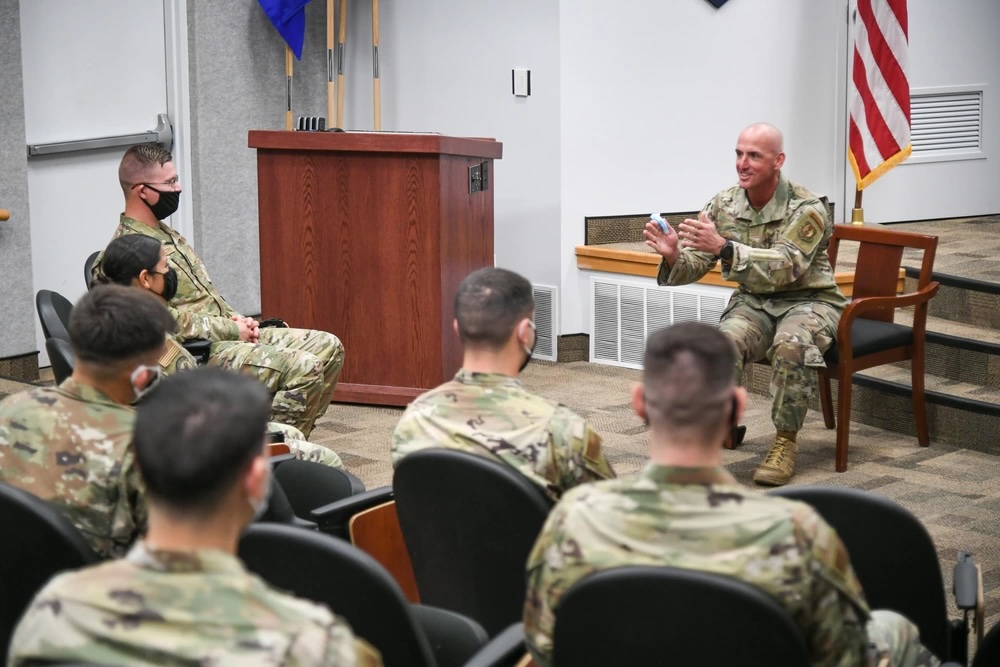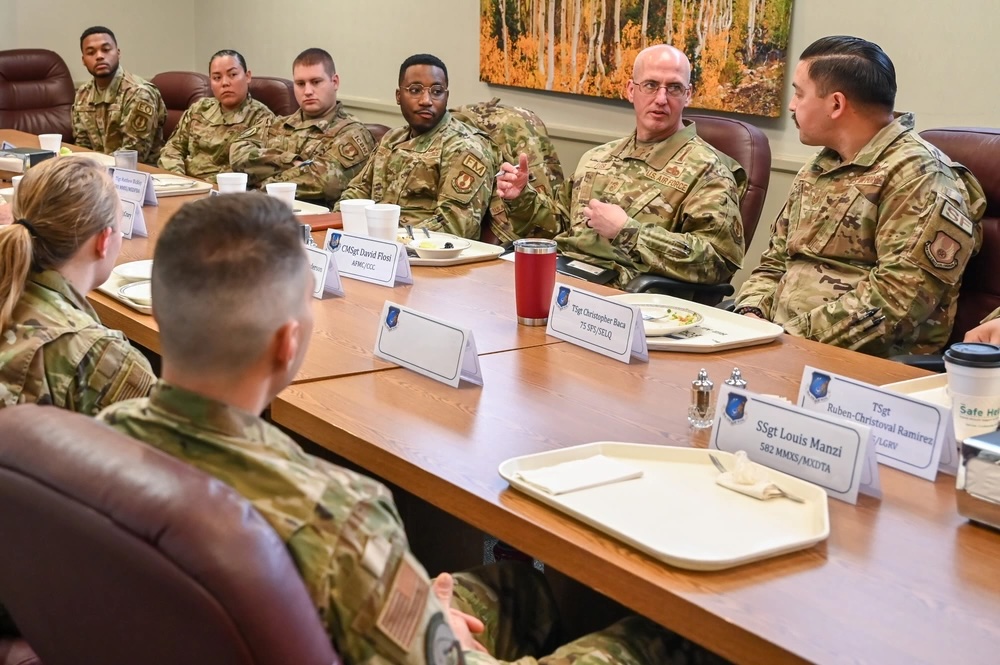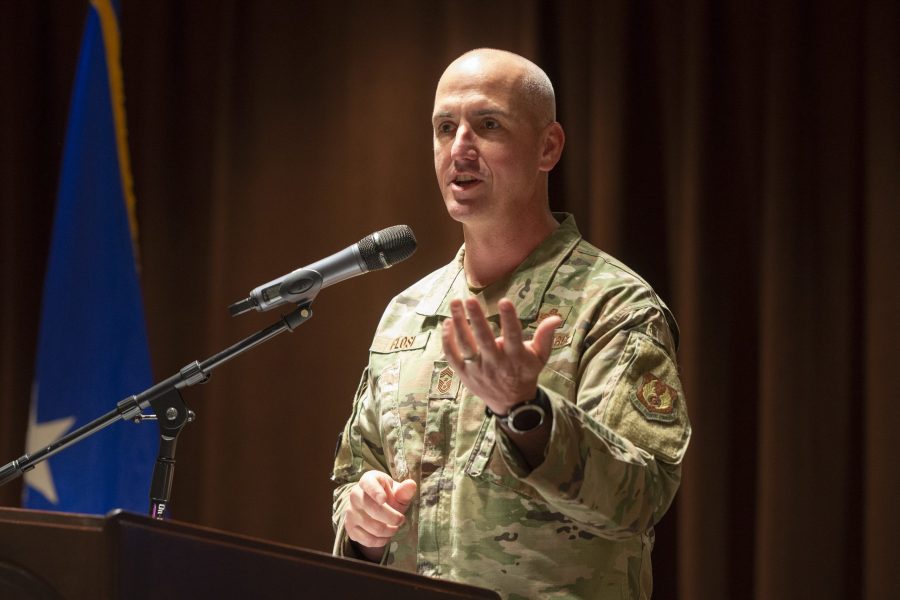When he was 22 years old, David Flosi was engaged, studying finance, working full time to pay for college, and running out of money. Something had to be done.
“I had a friend who enlisted right out of high school and was coming to the end of his contract, and we went on like a two-hour drive and talked,” he told Air & Space Forces Magazine. “I saw the Air Force as a means to an end: get the GI Bill, finish my degree debt-free, and support a new family.
“That’s why I enlisted,” he added. “It’s not why I stayed.”
Indeed, when Flosi [pronounced ‘flossy’] became the 20th Chief Master Sergeant of the Air Force at a ceremony at Joint Base Andrews, Md., on March 8, it was in part thanks to the mentors sitting in the audience who helped him grow into a career Airman with a Legion of Merit, the Bronze Star, and 28 years of service to his country.
“I was completely blessed,” he said about the mentors who shaped his path.
With his background studying finance, Flosi thought he would join that career field when he enlisted in 1996, but he wound up in an open mechanical slot and became a nuclear weapons specialist after discussing the options with his then-fiancée, Katy.
“[Explosive ordnance disposal] was what I wanted to do initially and that scared her. Nuclear weapons did not,” he laughed. “So that rose up on the list.”
It was not always easy at first, partly because Flosi did not fully buy into living the Air Force core values 24 hours a day.
“Like most chiefs, I did not walk this completely clean path,” he said. “There were a few moments where maybe I wasn’t as disciplined as I should have been, so I had to grow up a little bit.”
Being held accountable for those moments helped Flosi internalize what it means to be an Airman, but he had a habit of asking questions, as his boss’ boss liked to remind him.
“I asked ‘why’ so much that he started making me pull out my [leave and earnings statement], and he’d look at it and say ‘That’s what I thought Airman Flosi, you ain’t getting no thinking pay,’” he said. “So I grew up in that era. But my immediate supervisor was very patient. He was like ‘All right, come here knucklehead,’ and he would walk me through the why, which I really needed. He figured me out and what I needed to be successful.”

That kind of support helped turn the Air Force from a job into a profession for Flosi. But he had a lot more to learn, especially as a brand-new staff sergeant leading other Airmen for the first time.
“Boy, do I feel bad for that first Senior Airman, because I just smothered this poor guy with all of my new leadership skills,” he recalled. “I learned a lot from that: I learned that leadership isn’t taking the book and dumping it on them. I needed to connect with this person, meet them where they’re at, and hopefully bring them to the right.”
Flosi had another big break when a senior NCO told him about the Air Force Institute of Technology, which offers graduate degree programs for enlisted and commissioned service members and government civilians. Flosi earned a Master’s degree in logistics and supply chain management, a move which he said changed the course of his career.
“I cannot believe I got the opportunity to go to graduate school and get paid to do it,” he said. “That would have never happened if I didn’t have these good leaders in place who actually were trying to take care of me.”
Flosi paid it forward by serving with distinction on deployments in support of Operations Southern Watch, Iraqi Freedom, Inherent Resolve, and Freedom’s Sentinel. He received the Bronze Star for his work during a tour in Afghanistan, and from 2017 to 2019, he was the command chief master sergeant of “DATA MASKED,” according to his resume, which drew interest on the unofficial Air Force subreddit.
“You can tell them that it was very cool,” he said when asked about the assignment.
Flosi’s latest post was as Command Chief Master Sergeant of Air Force Materiel Command at Wright-Patterson Air Force Base, Ohio. Over the course of his years as command chief of various units, Flosi picked up a few lessons about executing commander’s intent.
“Commanders have statutory authority. Chiefs don’t,” he said. “This is about relationships for us. And so our ability to get things done on behalf of the command, or to implement the guidance and commander’s intent, no matter where you’re at in the organization, is completely dependent on our ability to build relationships with people.”
Flosi’s new boss, Chief of Staff Gen. David Allvin, wants to make a long list of sweeping changes fast in order to prepare the service for a possible conflict with China or Russia. Flosi was involved in the conversations leading to those changes and agrees that speed will be a key factor in the effort.
“We are out of time,” he said. “The department, both the Air and Space Force, are not optimized for great power competition. And we must get there.”

Flosi flagged readiness as an area he particularly looks forward to helping change. Allvin said at the AFA Warfare Symposium that the service has metrics for each squadron’s ability to execute mission essential tasks, but there is no overarching assessment showing how well the service can, for example, re-operate, which means “the fight to get outta town and a fight to get into theater and a fight to get airborne,” Allvin said.
“Only when you have assessments can you really find out the details and put resources against them,” he added.
Quality of life, including pay and compensation, health care, and child care is an underlying part of warfighting readiness, Flosi said.
“It’s a foundational item,” he explained. “Our quality-of-life issues impact all of the other things that we’re trying to do.”
While his predecessor, former Chief Master Sergeant of the Air Force JoAnne Bass, was active on Facebook, Flosi is still working out his social media policy, acknowledging that the vast majority of service members use some form of the technology.
“We’re not going to ignore that,” he said. “We might do it a bit differently.”
One thing that will carry over from CMSAF #19 is a love for the Kansas City Chiefs football team. Though he was born in Florida, Flosi grew up in Kansas City and picked up a knack for barbecue.
“I tell people sometimes I have a smoking problem,” he said. “I’ll smoke vegetables, deviled eggs. It doesn’t have to just be pork.”
That skill set could prove a handy outlet over the next four years, which may be the most challenging of Flosi’s career. Part of a CMSAF’s job is to serve as the personal adviser to the Chief of Staff and the Secretary of the Air Force on the welfare, readiness, and morale of more than 600,000 Airmen across the force.
“I feel the enormity of the responsibility of the job: it’s important to not take for granted the opportunity that’s being presented,” he said. “Therefore I genuinely want to execute to the commander’s intent.”
He has a few guidelines to light the way. Flosi keeps a paper on leadership that he wrote for an assignment at the Senior NCO Academy back in 2011. Listed there are the values he holds dear, including integrity, accountability, direct feedback, transparency, fairness, and “seek first to understand.”
“I am constantly reminded that things are not always as they seem,” he wrote about that last value. “Sharpening this leadership trait sets the framework for trusting relationships focused on personal and professional success.”


